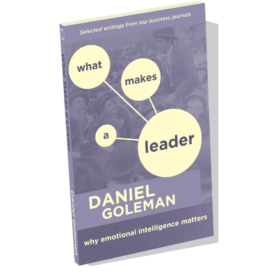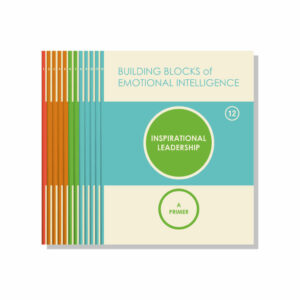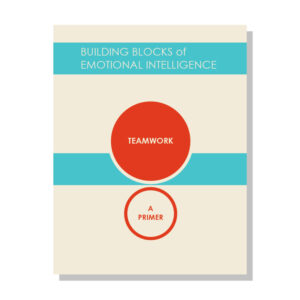
How’s your emotional intelligence?
Just as for IQ, there are several theoretical models of emotional intelligence, each supported by its own set of research findings. Daniel Goleman’s model, which has fared well in predicting actual business performance, looks at a spectrum of EI-based competencies that help leaders to be more effective.
Here are some questions that will help you reflect on your own mix of strengths and limits in EI. This is not a “test” of EI, but more of a “taste” to get you thinking about your own competencies:
- Are you usually aware of your feelings and why you feel that way?
- Are you aware of your limitations as a leader, as well as your personal strengths?
- Can you manage your distressing emotions, such as by recovering quickly when you get upset or stressed?
- Can you adapt smoothly to changing realities?
- Do you keep your focus on your main goals, and know the steps it takes to get there?
- Can you usually sense the feelings of the people you interact with and understand their way of seeing things?
- Do you have a knack for persuasion and using your influence effectively?
- Can you guide a negotiation to a satisfactory agreement and help settle conflicts?
- Do you work well on a team, or do you prefer to work on your own?
In addition to a self-evaluation, it can be helpful to solicit honest feedback from peers, either in the form of anonymous written critiques or in a group setting with people who know you and can give you feedback about your behavior.
You can also investigate the 360-degree Multi-Rater Assessment, a process that Daniel Goleman helped to develop. Here’s how it works: a certified coach asks your bosses, peers, direct reports, clients, and sometimes family members to critique your emotional and social intelligence abilities. Using this feedback, you can then start to understand the gaps in your EI abilities and look for ways to improve your performance.
No matter which approach you take, chances are you’ll receive some negative feedback. Try not to to focus on your EI shortcomings though; they’re just as important in order to fully understand your strengths.
 Learn more about developing your emotional intelligence in Daniel Goleman’s book, What Makes a Leader: Why Emotional Intelligence Matters. The book presents Goleman’s groundbreaking and highly-sought after articles from the Harvard Business Review as well as his Egon Zehnder International articles compiled in one volume. This often-cited material is proven-effective and has become essential reading for leaders, coaches, and educators committed to fostering stellar management, increasing performance, and driving innovation.
Learn more about developing your emotional intelligence in Daniel Goleman’s book, What Makes a Leader: Why Emotional Intelligence Matters. The book presents Goleman’s groundbreaking and highly-sought after articles from the Harvard Business Review as well as his Egon Zehnder International articles compiled in one volume. This often-cited material is proven-effective and has become essential reading for leaders, coaches, and educators committed to fostering stellar management, increasing performance, and driving innovation.
To figure out which aspects of emotional intelligence need work, Goleman’s What Makes a Leader suggests “imagining your ideal self” five to 10 years from now. What would your typical day be like? Who would be there? What sorts of relationships would you have with them? Consider your “deepest values and loftiest dreams.” How would these be part of your daily life?
Next: Learn how your ideal self compares with your current self. Goleman recommends answering such questions as:
• Are you usually aware of your feelings and why you feel that way?
• Can you manage your distressing emotions well””e.g., recover quickly when you get upset or stressed?
• Can you usually sense the feelings of the people you interact with and understand their way of seeing things?
• Do you have a knack for persuasion and using your influence effectively?
Don’t just introspect. You also need to find out how you make others feel and how they see your leadership style. This can be tough to glean, of course, especially from employees. One possibility is to solicit anonymous written critiques. You also might form or join a support group in which peers who know you well (perhaps outside your company) give you frank opinions about your behavior.
Then there’s “360-degree Feedback,” a process Goleman helped develop. In 360, a certified coach would have bosses, peers, direct reports, clients and sometimes family members critique your “social intelligence”””the empathy and social-skills part of EI. Among other things, they would consider your sensitivity to people’s needs, your mentoring style, your interest in others’ opinions and your tendency (or lack thereof) to bring out the best in people.
Once the feedback rolls in, resist the temptation to dwell only on your EI shortcomings. It’s “just as important, maybe even more so, to understand your strengths,” Goleman writes. He finds, for instance, that most entrepreneurs are resilient and innovative. “Knowing where your real self overlaps with your ideal self will give you the positive energy you need to move forward to the next step in the process””bridging the gaps.”
– See more at: http://www.success.com/article/the-leadership-secret-to-supercharging-your-team#sthash.szPKo2h8.dp
To figure out which aspects of emotional intelligence need work, Goleman’s What Makes a Leader suggests “imagining your ideal self” five to 10 years from now. What would your typical day be like? Who would be there? What sorts of relationships would you have with them? Consider your “deepest values and loftiest dreams.” How would these be part of your daily life?
Next: Learn how your ideal self compares with your current self. Goleman recommends answering such questions as:
• Are you usually aware of your feelings and why you feel that way?
• Can you manage your distressing emotions well””e.g., recover quickly when you get upset or stressed?
• Can you usually sense the feelings of the people you interact with and understand their way of seeing things?
• Do you have a knack for persuasion and using your influence effectively?
Don’t just introspect. You also need to find out how you make others feel and how they see your leadership style. This can be tough to glean, of course, especially from employees. One possibility is to solicit anonymous written critiques. You also might form or join a support group in which peers who know you well (perhaps outside your company) give you frank opinions about your behavior.
Then there’s “360-degree Feedback,” a process Goleman helped develop. In 360, a certified coach would have bosses, peers, direct reports, clients and sometimes family members critique your “social intelligence”””the empathy and social-skills part of EI. Among other things, they would consider your sensitivity to people’s needs, your mentoring style, your interest in others’ opinions and your tendency (or lack thereof) to bring out the best in people.
Once the feedback rolls in, resist the temptation to dwell only on your EI shortcomings. It’s “just as important, maybe even more so, to understand your strengths,” Goleman writes. He finds, for instance, that most entrepreneurs are resilient and innovative. “Knowing where your real self overlaps with your ideal self will give you the positive energy you need to move forward to the next step in the process””bridging the gaps.”
– See more at: http://www.success.com/article/the-leadership-secret-to-supercharging-your-team#sthash.szPKo2h8.dpuf
To figure out which aspects of emotional intelligence need work, Goleman’s What Makes a Leader suggests “imagining your ideal self” five to 10 years from now. What would your typical day be like? Who would be there? What sorts of relationships would you have with them? Consider your “deepest values and loftiest dreams.” How would these be part of your daily life?
Next: Learn how your ideal self compares with your current self. Goleman recommends answering such questions as:
• Are you usually aware of your feelings and why you feel that way?
• Can you manage your distressing emotions well””e.g., recover quickly when you get upset or stressed?
• Can you usually sense the feelings of the people you interact with and understand their way of seeing things?
• Do you have a knack for persuasion and using your influence effectively?
Don’t just introspect. You also need to find out how you make others feel and how they see your leadership style. This can be tough to glean, of course, especially from employees. One possibility is to solicit anonymous written critiques. You also might form or join a support group in which peers who know you well (perhaps outside your company) give you frank opinions about your behavior.
Then there’s “360-degree Feedback,” a process Goleman helped develop. In 360, a certified coach would have bosses, peers, direct reports, clients and sometimes family members critique your “social intelligence”””the empathy and social-skills part of EI. Among other things, they would consider your sensitivity to people’s needs, your mentoring style, your interest in others’ opinions and your tendency (or lack thereof) to bring out the best in people.
Once the feedback rolls in, resist the temptation to dwell only on your EI shortcomings. It’s “just as important, maybe even more so, to understand your strengths,” Goleman writes. He finds, for instance, that most entrepreneurs are resilient and innovative. “Knowing where your real self overlaps with your ideal self will give you the positive energy you need to move forward to the next step in the process””bridging the gaps.”
– See more at: http://www.success.com/article/the-leadership-secret-to-supercharging-your-team#sthash.szPKo2h8.dpuf







